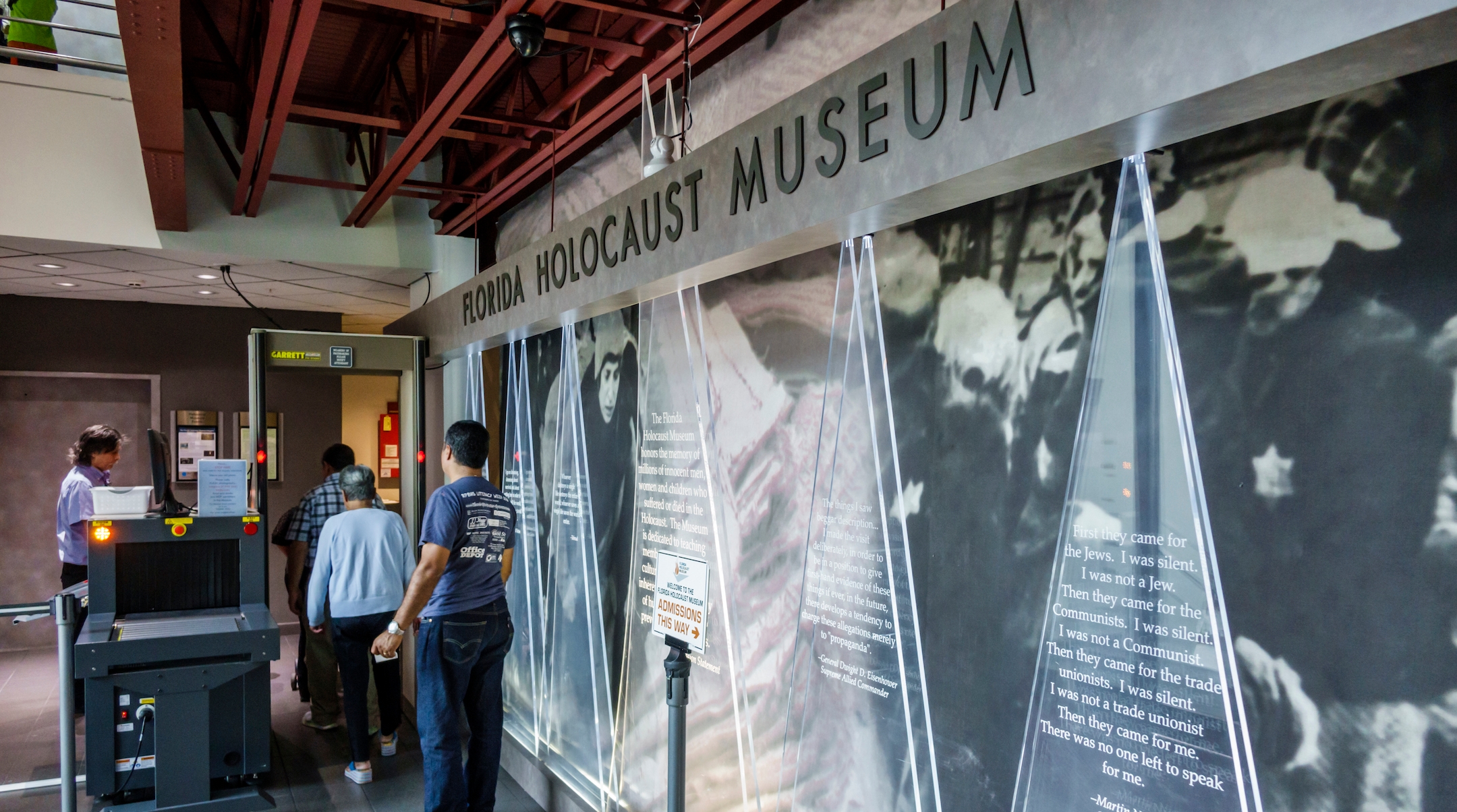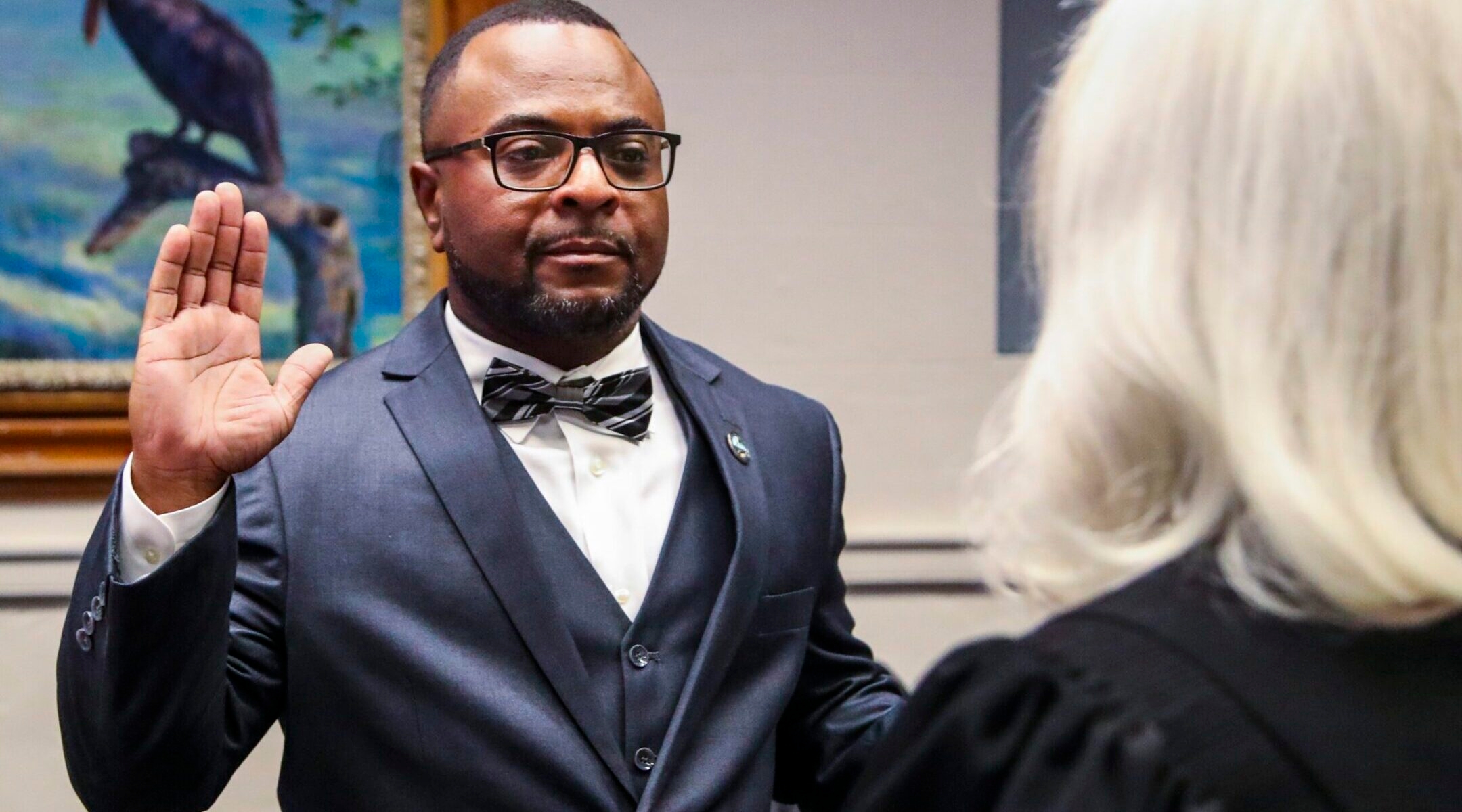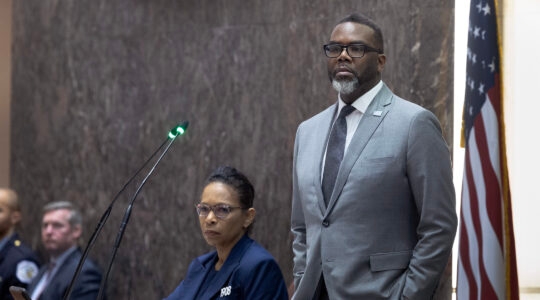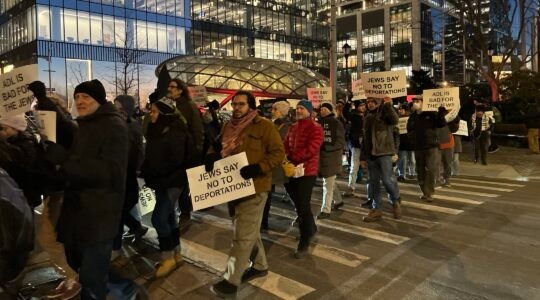(JTA) – When Brother John Muhammad emerged this fall as the leading candidate for a vacant city council seat in St. Petersburg, Florida, local Jews were distressed.
Muhammad is well known in the city as the president of a local neighborhood association and as a frequent advocate for minority groups. But Jewish leaders learned that he was also a follower of Louis Farrakhan, the Nation of Islam leader who has a long history of antisemitism, and that he had made comments dismissing concerns about Farrakhan’s record.
Jewish leaders tried to stave off Muhammad’s appointment, pushing for more extensive vetting of the seven candidates and, in the case of the local Holocaust museum, actively lobbying against him. But the council confirmed him in a 4-3 vote, leaving local Jews frustrated — before they considered ways to make the situation a learning experience for their city.
“When I see a situation like this, it screams ‘opportunity’ to me,” Michael Igel, chair of the Florida Holocaust Museum, located in St. Petersburg, told the Jewish Telegraphic Agency.
The saga playing out in St. Petersburg, Florida’s fifth-largest city, unfolded during the same period that a handful of Black celebrities, including Kanye West and Kyrie Irving, first became enmeshed in controversy over their own antisemitic comments and social media posts. The coincidence meant a dicey environment for broaching a conversation about the antisemitism of the Nation of Islam, whose rhetoric disparaging Jews overlaps with that of Hebrew Israelites, the ideology that Irving promoted by sharing a link to an antisemitic film.
It also turned St. Petersburg into a window for understanding how ties forged between Jewish groups and others can be tested.
Local Jewish leaders initially sought to stop Muhammad from gaining the city council seat, which was vacated after its previous holder resigned following redistricting and accusations she no longer lived in her district. They learned about Muhammad’s city council application only a week before the council’s vote, leaving them with little time to mobilize. The information came from a political rival of Muhammad, former mayoral candidate Vince Nowicki, who shared information about Muhammad’s Nation of Islam affiliation with local Jewish groups.
Nowicki also shared a comment Muhammad had made about Jews in a 2016 video in which Muhammad interviewed local Black LGBTQ activists. In the video titled “A Conversation About Growing Up Black And LGBT,” which JTA viewed, Muhammad said, “Minister Farrakhan got accused of being antisemitic for a long time because he pointed out and made some corrections about the activity of Jews. And anybody who says anything critical of the Jewish community is labeled as being antisemitic. Good, bad, right or wrong, it doesn’t matter what you say. If you criticize them that’s what you are.”
He continued, saying, “And I’m finding that it happens when you are critical of the gay community, when you say anything critical or anything that doesn’t align with that ideology, now all of a sudden you’re homophobic.” Muhammad’s comments about gay people received some light but friendly pushback from his interview guests.
Muhammad did not reply to multiple requests for comment by JTA, including to questions emailed to him at his request. He said during a public meeting ahead of the council vote that he thought scrutiny of him by Jewish groups had been unfair.
To Jewish leaders, the comments in the video coupled with Muhammad’s Nation of Islam affiliation were clear signs that he should not be appointed to the city council.
“I would sure hope that being antisemitic would be a red line, that you could not be a candidate,” said Rabbi Philip Weintraub of Congregation B’nai Israel, a Conservative synagogue in the city.
Jewish leaders began to take action, issuing statements and launching a letter-writing campaign to the council. They felt so much urgency that some even conducted business on Simchat Torah, a Jewish holiday when Jewish organizations typically pause their activities in accordance with Jewish law.
As a nonprofit, the local federation was constrained in how it could weigh in. Since it could not endorse or oppose specific candidates, it instead pushed for every candidate to be “properly vetted” and informed council members about Muhammad’s affiliations and past comments, according to Maxine Kaufman, executive director of the Jewish Federation of Florida’s Gulf Coast. She said the efforts did not have their intended effect.
“I don’t think anybody said, ‘Well, who is this Farrakhan, what does he stand for?’” Kaufman said. “I don’t think enough was done, personally.”

The entrance to the Florida Holocaust Museum in St. Petersburg, Nov. 27, 2016. (Jeffrey Greenberg/Universal Images Group via Getty Images)
The Florida Holocaust Museum took another approach, circulating information about Muhammad to the wider community, along with a statement opposing the candidacy of anyone who would support Farrakhan’s antisemitism. Their goal, Igel said, was to educate the community about the severity of these views.
“There’s nothing else to talk about when somebody is supporting Louis Farrakhan,” Igel told JTA. “Particularly when you are seeking a position representative of a city, particularly one like St. Petersburg that is so known for its inclusivity and its openness.”
Igel praised some members of the city council who asked Muhammad pointed questions about his views at the vote, giving him the opportunity to refute Farrakhan’s comments about Jews. One council member who voted against Muhammad, Lisset Hanewicz, said her stepfather is Jewish and read Farrakhan’s past antisemitic statements into the record, saying, “I think people need to understand why a certain part of this community is upset.”
Igel acknowledged that getting involved in a city council appointment was an unusual move for a Holocaust museum. He said museum leaders had held a meeting beforehand to determine how to proceed but made a decision fairly quickly to weigh in.
“In this case, we don’t consider this to be a matter of politics,” Igel said. “This is a matter of morality. And this is what we teach.” If the candidate had been a white supremacist, Igel said, “that person would have been disqualified out of the gate.”
The Anti-Defamation League and Southern Poverty Law Center, two hate watchdogs, define the Nation of Islam as a group that propagates antisemitism and other forms of bigotry, not a religion. Founded in 1930 by Wallace Fard Muhammad, the Black nationalist group is not the same as traditional Islam and is rejected by most Muslim clerics; it entered mainstream prominence in the 1960s after civil rights leader Malcolm X and boxer Muhammad Ali publicly joined the movement. (Both later left the group, with Malcolm X publicly denouncing its leadership; he was assassinated shortly after, and two Nation of Islam members who were wrongfully convicted of his murder recently received a large settlement from New York City.)
The Nation of Islam entered its current era after Farrakhan took over the group in 1977. Now 89, he has used his platform to issue a steady stream of antisemitism, including calling Jews “wicked” and the “synagogue of Satan,” saying they have “wrapped your tentacles around the U.S. government,” and calling Hitler “a very great man.” Only a few years ago, the Women’s March progressive activist collective was nearly derailed over some of its founders’ associations with Farrakhan.
It is rare, but not unheard of, for public officials to have current or former associations with the Nation of Islam. Minnesota Attorney General Keith Ellison, a practicing Muslim, was dogged by accusations that he had formerly been a member of the group when he first ran for Congress in 2006; he apologized for his past associations with the group. Trayon White, a Washington, D.C. council member and onetime mayoral candidate who has spread antisemitic conspiracy theories, has donated to the group in the past. Former President George W. Bush once praised the group, and a photograph showing Barack Obama in the same room as Farrakhan was fodder for Obama’s critics during his presidential run.
Muhammad, who is referred to on the city council website as John Muhammad and whose legal name is John C. Malone, declined to condemn Farrakhan at the city council meeting.
“I am not willing to denounce the leader of my faith no more than a Catholic would be willing to denounce their pope,” he said.
Muhammad’s reaction to questions about Farrakhan particularly concerned the federation and other local Jewish groups. Kaufman told JTA she didn’t know whether Muhammad himself is antisemitic, but she said his refusal to disavow Farrakhan was alarming.
“I do have issue with his reverence of someone who is blatantly antisemitic, and he won’t disavow him, he won’t reject him,” she said, echoing the the federation’s official statement on the vote.
At the meeting, Muhammad did say that he had reached out to the Florida Holocaust Museum but had not heard back — and that he thought the museum’s criticism of him was unfair.
“What I found when we reached out to have dialogue with the Holocaust Museum director, they did not want to talk to me,” he said. “They wanted to evaluate and disqualify me based on the association that I have as an individual. I don’t think that that’s just.”
Muhammad also defended his record with Jews by claiming that they were among the “diversity of those who support me.” He added, “And if you look at those who oppose me, they’re coming from one particular group.”
Since the vote, a local Black newspaper condemned the scrutiny on Muhammad, calling it a “perusal into his faith practice.”
Igel said the museum had no record that Muhammad had reached out but encouraged him to come and learn more about the Holocaust and the nature of antisemitism. Stuart Berger, head of the local Jewish Community Relations Council, acknowledged at the city council meeting that Muhammad “has made himself available to us” at the federation, but that none of the federation staff “had been in direct contact with him.”
The federation’s involvement in Muhammad’s case became its own issue at the council vote, when the candidate referenced an email Berger had written to the county commissioner. In the email, Berger wrote that Muhammad’s vetting process had been “good enough for me!”
While Muhammad took the email as proof that the federation believed him to be fit for office, Berger and Kaufman maintain that it meant nothing of the sort. Berger had not been speaking on behalf of the federation, they say, and had not intended for his email to be shared publicly.
Now that Muhammad is on the council, attention has turned to building relationships with him. Kaufman has been meeting with individual city council members, and hopes to eventually meet with Muhammad himself. She also aims to have the federation make a presentation to the council about the dangers of antisemitism and push them to make a statement about it.
She doesn’t think it’s complicated. “I think hate’s hate,” she said. “Many different colors.”
Weintraub’s congregation is celebrating its 100th anniversary in March, and one of its congregants, Eric Lynn, is also involved in politics: he was the Democratic nominee for Florida’s 13th Congressional district in the midterms but lost his race to Republican Anna Paulina Luna, who said she was raised as a Messianic Jew and campaigned with far-right Rep. Marjorie Taylor Greene.
Weintraub himself is a member of an interfaith ministerial dialogue group with Black churches and says he’s “a professional optimist” when it comes to managing conflict between different communities. He sent JTA an episode of the public radio podcast “Hidden Brain” about how to keep conflict from spiraling, saying it “describes what I’ve tried to do.”
Since Muhammad was appointed, Weintraub has met with him; the pair had what Weintraub described as “a pleasant conversation.” The two talked about parenting and “shared traumas,” he said. They did not discuss Muhammad’s comments supporting Farrakhan, but the rabbi couldn’t help but think about him.
“I thought I was a termite, according to Farrakhan,” Weintraub said. In contrast, Muhammad “said I was a person, so that was nice.”
JTA has documented Jewish history in real-time for over a century. Keep our journalism strong by joining us in supporting independent, award-winning reporting.






